04 Jun 2015
What Are Soft Addictions?
The term soft addiction is fairly new, and it can be misleading or even offensive to people with true addictions. A soft addiction is not really an addiction at all. It’s more like a bad habit, but like a true addiction, these bad habits can keep you from living a satisfying, happy and meaningful life. Consider the times during the day in which you zone out and try to de-stress. Maybe it’s when you lose an hour on Facebook or you sit down to watch a half-hour TV show and don’t get up for two hours. These moments are made up of soft addictions and they are preventing you from living your best life.
Soft Addiction vs. Real Addiction
A soft addiction can best be compared to a behavioral addiction. A true behavioral addiction occurs when you compulsively engage in some kind of activity. Let’s use shopping as an example. If you have a real addiction to shopping, you spend most of your time thinking about it. You spend hours each day shopping online. Your finances are in the tank because you get out of control when you shop. You try to ease off, but you can’t
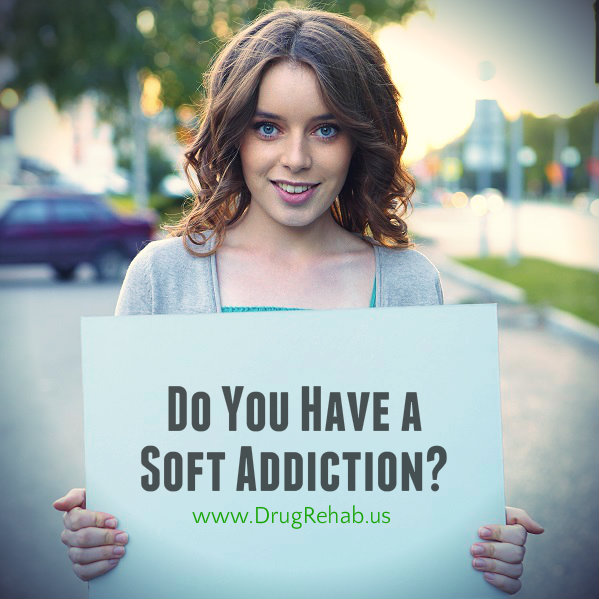 If your shopping habit is more of a soft addiction, on the other hand, you aren’t out of control. It’s probably something you do to relax or escape from the day’s stresses. You might spend a half hour online browsing a couple days a week, or you spend Saturday afternoons at the mall buying a couple of new outfits. You spend more than you should, but you aren’t going into debt and you don’t feel out of control.
If your shopping habit is more of a soft addiction, on the other hand, you aren’t out of control. It’s probably something you do to relax or escape from the day’s stresses. You might spend a half hour online browsing a couple days a week, or you spend Saturday afternoons at the mall buying a couple of new outfits. You spend more than you should, but you aren’t going into debt and you don’t feel out of control.
Recognizing Your Soft Addictions
Soft addictions are insidious and hard to recognize. Think of the times during the day when you engage in an activity mindlessly. It could be spending time online, watching TV, reading celebrity magazines or even gossiping with coworkers. These habits aren’t always bad. Some amount of mindless activity is helpful for coping with stress. But when you lose too much time to them, you need to make a change. Pick out what you think might be your soft addictions and then record how much time you spend on them, how they make you feel, and what you could have been doing instead that would have been more rewarding.
Changing Your Behaviors
When you start to recognize your soft addictions, you will begin to realize you are wasting time on meaningless things. You’re on Facebook when you should be productive at work. You’re watching mindless reality TV when you should be connecting with your partner. Changing these habits won’t be easy, but it will be rewarding. Start by setting time limits. When you sit down to watch those reruns you’ve seen a million times already, give yourself half an hour to relax and then turn the TV off.
At the end of your time limit, find something better to do, and make sure it isn’t another mindless bad habit. Call a friend you haven’t spoken to in a while. Have dinner with your partner and have a meaningful conversation. Get started on that home project you’ve been putting off. Do something creative, like painting or writing. Read a piece of classic literature. The key is to do something meaningful.
When you start noticing your soft addictions and begin replacing them with more meaningful activities, you will realize just how rewarding it is to make these changes. Soft addictions try to fill holes in our lives, but they fail, and they can turn into true addictions. Be aware and start making changes now for a better life.
Read More About Behavioral Addictions
09 Mar 2015
Are You Addicted To Love?
Yes, it’s true. You can be addicted to love. This isn’t the same as a sex addiction, although it can manifest certain sexual behaviors. Love addiction means that you are obsessed with being in love, whether with one particular person or with fantasies about love and romance. Love addiction is what we call a process or behavioral addiction. You aren’t hooked on an illegal drug or alcohol. You are addicted to a behavior, a pattern of thoughts and a fantasy of love that isn’t real. Learn to recognize it in yourself and how to get help.
Recognizing Love Addiction
A behavioral addiction like this may not seem as serious as a chemical addiction. You’re not shooting up heroin or drinking vodka in the morning, how bad could this be? Behavioral addictions are destructive in their own ways. It is just as important to recognize harmful patterns of a behavioral addiction and to get help as it is for a drug addict to get sober.
Signs Of Love Addiction
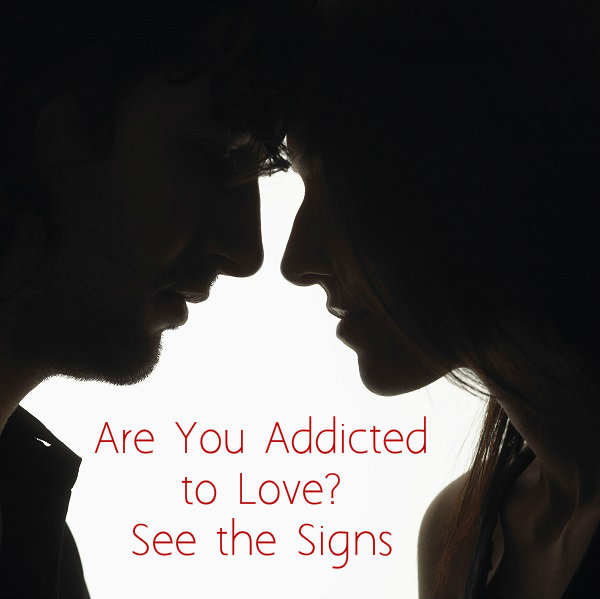 There are a few different ways in which a love addiction can manifest. If you are worried about your current relationship, consider these signs:
There are a few different ways in which a love addiction can manifest. If you are worried about your current relationship, consider these signs:
- You constantly break up and get back together with your current partner.
- Your friends and family tell you they are worried about your relationship or that your partner isn’t good for you.
- You start to fee lost or empty when not with your partner.
- You feel desperate when you break up. You feel like you can’t go on without him.
- When you get back together you feel a sense of euphoria or a high. You break up and make up to chase that feeling.
A love addiction may also be present even when you don’t have one particular partner. You may constantly seek out the euphoric feeling when you first start seeing someone by starting and ending relationships quickly. In other words, you are hooked on the early infatuation of a relationship, but get bored as it becomes routine and normal.
You might also be addicted to love and romance fantasies. Maybe you read romance novels compulsively, one after the other, and dream of having a fantasy love life. You find yourself constantly disappointed with your real-life relationships because they can’t compare with the fantasies you have imagined.
Getting Help For Love Addiction
If you are worried that you might have a love addiction or are headed down that road, recognizing it is the first step. Now you can take steps toward getting better and learning to have healthy and realistic relationships that satisfy your natural need for love and intimacy. If you are in a relationship that seems unhealthy, take a step back. Slow it down and think about ending it if necessary. Talk to your partner about your concerns. If he is not supportive of making changes, it’s probably time to break up.
You should also consider seeing a therapist. A professional experienced in working with love addicts can help you clarify your situation and figure out how to change your attitudes and behaviors toward love and relationships. Also consider joining a support group. There are groups for love addicts, and making social connections with people who understand your situation can be a powerful and healing experience. Here you will be able to share your story without fear of judgment, learn from the stories of others and have new friends to hold you accountable. Love addiction is not drug addiction, but it can be harmful and it hinders your ability to have satisfying relationships. Evaluate yourself now and get help if you feel you need it.
A New Beginning Can Be Yours – Don’t Be Ashamed To Call Us Now For Help – You Deserve Better!
14 Oct 2014
Are You Addicted To Love?
Process addictions, also known as behavioral addictions, don’t always get the same kind of attention as chemical dependencies, but they can be just as serious. Love addiction, which should not be confused with sex addiction, can prevent you from having normal relationships or from ever being satisfied with one. If you are constantly obsessing over one person, a fantasy of your true love or a fantasy relationship, you could be suffering from a love addiction. It’s time to break the cycle.
What Is Love Addiction?
Love addiction is a process addiction. This means that instead of compulsively using a drug or alcohol, you are addicted to a behavior, a feeling or a person. In the case of love addiction you may be addicted to the feelings of infatuation or early love and go through a string of short-term relationships.
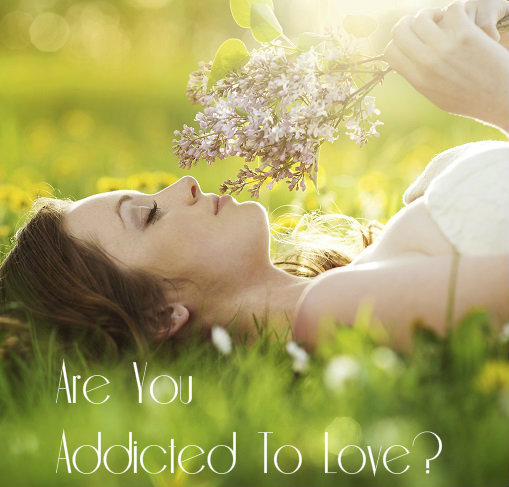 Or you might be addicted to your partner and the way he makes you feel, refusing to break it off even if the relationship takes an unhealthy turn. It could even be platonic love that has you hooked. The bottom line is that you obsess over it. The feelings you get from love, infatuation and fantasy take over your life.
Or you might be addicted to your partner and the way he makes you feel, refusing to break it off even if the relationship takes an unhealthy turn. It could even be platonic love that has you hooked. The bottom line is that you obsess over it. The feelings you get from love, infatuation and fantasy take over your life.
At the root of a love addiction is the idea that another person, either real or imagined, can make your life perfect and love you unconditionally. This idea may result from a past history of being abandoned or not being loved enough. It may be that your parents didn’t meet your needs for love and affection. Now, as an adult, you have low self-esteem and look for validation from an outside source when really you should be your own validation.
How Do I Get Over A Love Addiction?
Love addiction is unhealthy because it means that you place unrealistic expectations on others, you fail to take care of yourself and you fail to develop a healthy relationship of mutual respect and love. If you recognize the signs of love addiction in your actions, thoughts and feelings, it’s time to take action and turn things around. Only then will you learn to love yourself and give yourself the chance to have a real relationship.
Steps To Get Over Love Addiction
Here are some steps to take:
- Stop, analyze and assess – Take a step back from your relationships and really think about your behaviors. Make a list of the ways in which you behave inappropriately in your relationships. Consider how you feel and how you make your partner feel. Also think about past relationships and look for common patterns.
- Take responsibility for your own happiness – As a love addict you rely on someone else to make you happy. You think that you need a perfect partner to make your life complete. This is a mistake. You are the only one who can make you happy. Accept that now and begin to act on this truth.
- Consider therapy – There is a good chance that your obsession with love is related to your past. Working with a therapist can help you come to terms with past relationships and how they have impacted you. Sometimes it takes the assistance of a professional to really heal.
- Be prepared for imperfection – As you feel ready to start up a new relationship be ready for the fact that it won’t be perfect. You can chase a perfect partner your whole life, but you’ll never find him. Prepare yourself to fall in love with someone who is imperfect, but perfect for you.
Breaking the habit of love addiction isn’t easy, but it will make your life infinitely better. Only when you begin to accept and love yourself, and reject the idea of a perfect fantasy partner, will you be ready to enjoy real love.
03 Oct 2014
Top 5 Most Addictive Behaviors
Drugs and alcohol are not the only things that can lead you down the path to a dangerous obsession and addiction. Behaviors can be addictive too. Experts call these behavioral or process addictions and they can be nearly as damaging as a drug addiction or alcoholism.
Most of us will not become obsessed with a behavior or activity to the point of addiction, but none of us are completely risk-free. Learn what the experts say are the most potentially addictive behaviors so that you can avoid getting hooked on them. While you need not avoid these activities entirely, you should be aware that they can lead to addictive behaviors.
Top Behavioral Addictions
Researcher Dr. Reef Karim, a specialist in behavioral addictions, reviewed studies to find which behaviors are the most addictive.
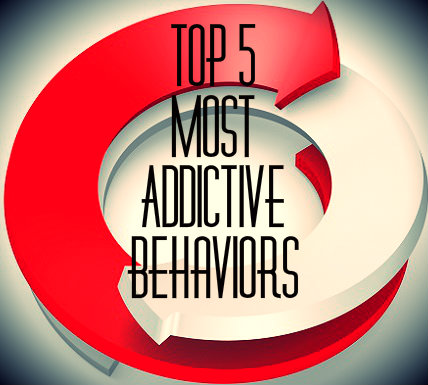 Gambling – Gambling tops that list. Gambling disorder affects two percent of the population and is the only behavior that gets widespread support as a true behavioral addiction. Much research on problem gambling has been conducted and has found that gamblers experience a high when winning, similar to the experience of drug use. They also experience withdrawal when not gambling, including physical symptoms like headaches and insomnia.
Gambling – Gambling tops that list. Gambling disorder affects two percent of the population and is the only behavior that gets widespread support as a true behavioral addiction. Much research on problem gambling has been conducted and has found that gamblers experience a high when winning, similar to the experience of drug use. They also experience withdrawal when not gambling, including physical symptoms like headaches and insomnia.
- Internet And Gaming – This type of addictive behavior is a recent addition, but a powerful one. Most experts agree that Internet gaming disorder is a real problem for some people and one that is very similar to drug addiction. Much of the evidence for Internet addiction being a real disorder comes from Asia. Young men there in particular have become so obsessed with gaming that they stop eating and neglect all other responsibilities, including the care of children. This level of obsession is similar to what drug addicts experience.
- Sex Addiction – That sex can become addictive is not surprising. The experience activates the reward system in the brain, as do drugs and alcohol. While regular and frequent sex with one partner is not unhealthy, obsessive sexual activities are. Compulsively using pornography, looking for sex with strangers or engaging in exhibition are behaviors that are considered signs of an unhealthy obsession with sexual activities.
- Eating – Food also activates our reward centers, especially foods that are high in fat, sugar or salt. Eating disorders like bulimia and anorexia are dangerous and involve compulsive behaviors, but they are not addictive disorders. Compulsive overeating, on the other hand, shares characteristics with drug and alcohol addiction. Also known as binge eating, this behavior includes obsessing over food. Compulsive eaters tend to spend an unnatural amount of time thinking about food, planning meals, and frenzied eating to the point of getting sick. Between two and four percent of Americans may struggle with binge eating.
- Shopping – Compulsive shopping is controversial among experts. Some think it can be classified as a behavioral addiction, while others are on the fence. More research is needed to clarify, but it seems that buying something you really want activates the reward system in your brain. Developing this obsession is harmful because it can lead to serious financial problems.
There are a number of behaviors that can become obsessive, but these five are the most common. Just like a drug addiction, these behaviors can cause you to engage in them compulsively, ignore your responsibilities, develop withdrawal, experience highs and ultimately even ruin your life. Be aware of the possibility of behavioral addictions and look for signs of obsessions in yourself and those you love so you can get professional help if needed.
Read Our Other Behavioral Addictions Posts
25 Jun 2014
Are You Addicted To Tanning?
Tanning addiction is an example of what experts term a process or behavioral addiction. Unlike drug or alcohol addiction, there is no substance consumed; yet many of the symptoms overlap. Going for a tan, whether at a salon with artificially produced light or at the beach and under the sun, poses many risks, not least of which is skin cancer. Getting a little sun is healthy, but becoming obsessive about getting that golden glow could prove fatal.
What Is Tanning Addiction?
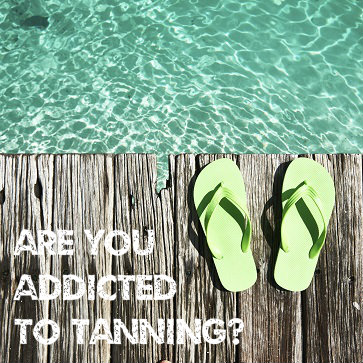 A process addiction is one that involves a behavior rather than a substance. People can become addicted to gambling, shopping, sex or even getting a tan. Research indicates that tanning addiction is a real phenomenon and one that mostly impacts younger women. What happens when you tan that can lead to an addiction is the same thing that happens when someone takes a hit of a drug, or wins at the blackjack table: you feel good.
A process addiction is one that involves a behavior rather than a substance. People can become addicted to gambling, shopping, sex or even getting a tan. Research indicates that tanning addiction is a real phenomenon and one that mostly impacts younger women. What happens when you tan that can lead to an addiction is the same thing that happens when someone takes a hit of a drug, or wins at the blackjack table: you feel good.
Exposure to both sunlight and the artificial light of a tanning bed produces a pleasurable release of endorphins in the body. Until it becomes uncomfortably hot, being out in the sun simply feels good. It’s also a powerful mood booster. As with substance abuse, some people are susceptible to abusing the feel-good sensation of tanning. They seek out the good feeling, as well as what they perceive to be an attractive tan, over and over again. Research shows that people addicted to tanning experience many of the same physical and psychological symptoms as alcoholics and drug addicts.
How Do I Know If I’m Addicted To Tanning?
A good way to check if you might be addicted to tanning is to look at those symptoms and signs of addiction that are common to both chemical and behavioral addictions. One of the first signs of an addiction of any kind is tolerance. This means that you need to spend more and more time under the tanning lights in order to get the pleasurable feeling you are seeking. For example, you may have started out tanning once a week, but then climbed to two or three times a week and then every day.
Another important sign of addiction is withdrawal. When you have to skip a tanning session for any reason, do you feel anxious or upset? If so, your body and mind are experiencing withdrawal from your “drug.” Other symptoms of addiction include obsessive thoughts and actions. Are you constantly thinking about getting your next fix? Has your life begun to revolve around tanning? Addiction also causes you to neglect your other activities. Have you let your work or academics slide? Are your relationships suffering? If you recognize these signs in yourself, you may have a problem.
What Are The Risks Of Tanning Too Much?
Over-tanning is very dangerous. The risk of addiction is serious because it can impact your life in many negative ways even though you are not a drug user or drinker. The bigger danger, however, is the effect of the tanning on your skin and your health. Melanoma, a type of skin cancer, is the deadliest form of cancer in the U.S. and the number one most preventable factor in developing it is the use of tanning beds.
If you feel that you have a problem with tanning, cut back or stop altogether. If you find that you can’t, turn to an addiction counselor experienced in working with process addictions. With the help of a professional you can kick the habit, and in doing so you just might save your life.


